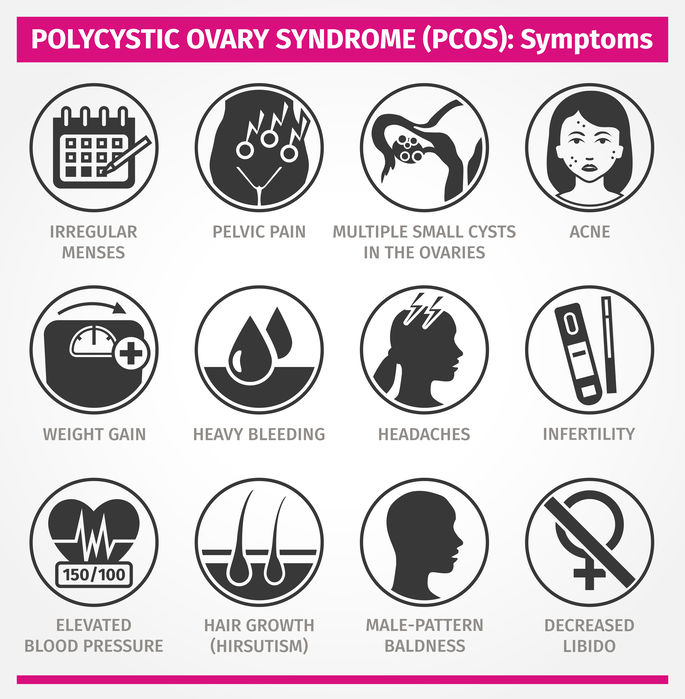Polycystic ovary syndrome (PCOS) is a more common health condition than you may have originally thought, affecting one out of 10 women of child-bearing age according to recent studies. No one wants to hear from their doctor that they have a health condition, however, fortunately, PCOS is a manageable condition that, if treated properly, can minimize the potential impact or development of other more serious health conditions. With science-backed information and an understanding of the precursors to PCOS as well as how to fight PCOS with diet and nutrition, you can reduce the impact of PCOS and the consequences of leaving the condition unmonitored.
Here’s how you can fight it and reduce the severity of symptoms with proper dietary and nutritional support.
What Is PCOS?

PCOS is typically classified as a condition causing inconsistencies in one’s menstrual cycle and metabolism as well as affecting one’s hormone levels. The condition is generally a result of multiple cysts forming on the ovaries, an impact of the overproduction of androgens, a hormone, in the body. While the condition itself is not severe, leaving it unmanaged can precursor more immediately harmful diseases such as diabetes, cardiovascular problems, endometrial cancer, and depression.
Fortunately, PCOS is not an entirely difficult condition to manage. Studies report that approximately 50% of women suffering from the condition are overweight or obese. This suggests that a change in diet and introduction of positive nutritional habits may minimize the impact of the condition as well as help women without the condition minimize their risk of developing it.
Let’s take a closer look at how your diet affects PCOS so that we can develop a greater understanding of how to optimize your diet to fight it.
How One’s Diet Impacts PCOS
In many cases, women suffering from PCOS are shown to have higher insulin levels in their bodies. The insulin hormone is produced in the pancreas and is responsible for assisting cells in the process of turning sugar (glucose) into energy capable of being used by the body throughout the day. When your body does not produce enough insulin needed to convert sugar into energy, blood sugar levels will rise to compensate for the lack of insulin – an impact also seen in those with insulin resistance. The result of an increase in blood sugar levels is a sudden spike in insulin levels as your body tries to balance your blood sugar levels. This quick increase in insulin levels is responsible for the ovaries producing more androgens, such as testosterone, which is a precursor process to developing PCOS.
To put things simply, bodies that do not regularly produce insulin or suffer from insulin resistance will overcompensate insulin levels as blood sugar levels rise. This dramatic increase of insulin to balance insulin-to-blood sugar levels is responsible for the production of androgens in ovaries which leads to the formation of PCOS-causing cysts.
But, how is one’s diet responsible for low insulin levels or insulin resistance? Well, reports indicate that diet affects insulin levels through the consumption of too many calories as well as the intake of certain types of food groups. In saying so, poor diets are directly linked to insulin resistance which is one of the main contributors to the development of PCOS.
How Can Women Improve Insulin Sensitivity?
Based on the information and research above, improving your insulin sensitivity is the first step to managing or minimizing the development of PCOS. But, how exactly does one go about doing so? Let’s look into some of the go-to ways of managing better insulin sensitivity.
Tip #1: Support Your Weight Loss Goals
One of the most crucial steps in supporting insulin sensitivity is assisting your weight loss goals through practicing regular exercise. Whether you want to sign up for the gym or would prefer to do yoga from the comfort of your own home, making the effort to lose any amount of weight is a start to supporting insulin sensitivity and combating PCOS.
Tip #2: Get More Active

In line with supporting your weight loss goals through exercise, being more physically active on a day-to-day basis is critical in order to improve insulin sensitivity. While static exercise is a great way to burn fat, getting more active through cardiovascular activities such as running, swimming, cycling, or dancing will assist your weight loss goals further. In addition to that, supporting these activities through beneficial posture exercises will help you more effectively perform your activities – promoting insulin sensitivity in the process.
Tip #3: Eat Fewer Times a Day
Contrary to popular belief, eating substantial meals spaced out over longer periods is a healthy option for those wanting to lose weight. It is essential that you make use of this tip following best dietary practices as you want to be consuming foods that will keep you satiated for longer, helping minimize insulin resistance.
How Can Women Fight PCOS With Diet?
As we can see, fighting PCOS starts with taking care of the body, and there are few better ways to do so than improving one’s diet. This does not necessarily mean following a low-carb or keto diet, but does mean making positive changes to the amount and frequency that you eat as well as knowing which foods to eat and which food groups to avoid. Below, we have outlined your best choices to help you fight PCOS with dietary changes.
What Foods to Eat
- High fiber foods
- Unprocessed, natural foods
- Dark, leafy greens
- Healthy fats such as coconut oil and avocados
- Spices such as turmeric and cinnamon
- Fatty fish
What Foods to Avoid
- Foods with high levels of refined carbohydrates
- Foods containing excess sugar
- Processed, red meats
The reason for these suggestions is that these foods are known to either support weight loss (our What Foods to Eat category) or lead to weight gain (our What Foods to Avoid category).
How Can Women Fight PCOS With Nutrition?
While implementing and maintaining a healthy diet is the most critical part of battling PCOS, supporting your diet with reliable and clinically-proven nutritional supplements is an ideal way to boost the rate at which you are able to lose weight.
But, it is important to source the appropriate supplement to help do the job. If your goal is to lose weight to fight PCOS then opting for supplements that support the weight loss process will help you achieve your goals more efficiently. Whether you are adopting a low-carb, low-calorie intake keto diet or not, quality metabolic ketosis support supplements are an ideal addition to your nutritional habits. These supplements are scientifically approved and designed to regulate blood sugar levels, stimulating the use of fat for energy, and suppressing appetite – which are all positive effects aligned with the goals of fighting PCOS with diet and nutrition.
In Summary
PCOS is a common health condition commonly caused by imbalances in your insulin levels and often precursors more serious health risks. By improving your insulin sensitivity through exercising more, promoting weight loss through dietary changes, and supporting weight loss with nutritional supplementation, you can combat the consequences of leaving PCOS unmonitored. With a better understanding of what PCOS is and how to manage it, you can effectively fight PCOS with diet and nutrition.

